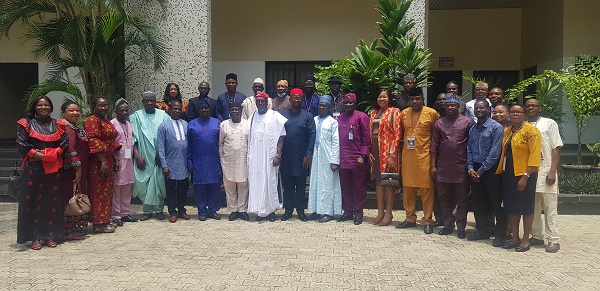…Solution-based research, panacea for self-reliance – Onu

Experts in the science and technology sector are currently deliberating on the critical significance of science, technology and innovation (STI) for Nigeria’s sustainable development.
Speaking at the opening ceremony of a two-day experts’ forum on science, technology and innovation organised by the National Centre for Technology Management (NACETEM) today (May 11, 2022) in Abuja, the Minister of Science, Technology and Innovation, Dr. Ogboannaya Onu, said the forum – which had in attendance lawmakers, policymakers, academics, researchers and bureaucrats – will foster synergy amongst the relevant stakeholders and actors in STI management system to transform research results from research institutes for national growth and development.
Onu, represented by the ministry’s director, human resources management, Mr. Francis Adebisi, maintained that Nigeria can only become self-reliant by engaging in solution-based research in the institutes.
“It is pertinent to note that most developing countries, such as Nigeria, are still faced with the challenges of inefficient exploitation of their huge and abundant human and material resources for nation-building. This is evident in their reliance on the export of natural resources and raw/unprocessed commodities such as fossil fuel, cash crops, unprocessed solid minerals and others as the major sources of revenue for the economy. This has exposed the country to economic instability occasioned by the vagaries of international commodities markets.
“The only available option to change this trajectory is enhancing the diversification of our dear nation’s economy through the application and deployment of cutting-edge research and innovation in all sectors of the economy: agriculture, biotechnology, health, information and communications technology (ICT), education, nanotechnology, space technology, etc. To make the needed impacts on society, research must be demand-driven and tailored toward solving societal problems and improving the quality of life of citizens. It has been irrefutably proven that ground-breaking research and commercialisation of research outcomes are bringing a paradigm shift in today’s world and any nation wishing to develop and grow at a fast pace must opt for solution-based research. There is no better time for research than now when Nigerians are trying to look inwards to find alternatives by using locally developed technologies to address national challenges,” he added.
In her remarks, the permanent secretary, Ministry of Science, Technology and Innovation, Mrs. Monilola Udoh, reiterated the minister’s assertion, stressing that solution-based research holds the key to the nation’s self-reliance.
Udoh commended NACETEM for the timely intervention and assured that the ministry will keep on coming up with policies that will assist the agency in achieving its mandate.
According to her, the newly revised National Science Technology and Innovation Policy (NSTIP) presents a veritable framework to move Nigeria from a resource-based economy to a knowledge-based and innovation-driven one.
In his opening remarks, the chairman, NACETEM governing board, Hon. Haastrup Olatunji said that the reviewed National Science, Technology and Innovation Policy has made improved provisions for research and development in the country. He called on the implementing entity to back the policy up with action, which has to begin with a change of attitude towards STI as a pivotal driver of development in a knowledge-based 21st century.
“It is because of the need to change this narrative that the National Centre for Technology Management (NACETEM), as a foremost research institution in science, technology and innovation management, has decided to bring key stakeholders together to fashion out the prioritisation of STI as a veritable tool of sustainable development in Nigeria. Any nation that relegates STI to the background in its developmental agenda may be left behind. To this end, all hands must be on deck to evolve new ways and methods of making STI a top priority in all we do as a nation,” he added.
Earlier in his welcome address, the NACETEM director-general, Prof. Okechukwu Ukwuoma, said the forum is designed primarily to bring together relevant stakeholders in the STI community to have robust discussions on issues such as roles of science, technology and innovation in wealth creation and sustainable development; planning, programming and budgeting for STI; national innovation system and the future of jobs for youths in Nigeria, among others.
He expressed belief that the forum will help deepen the knowledge of lawmakers, policymakers and other stakeholders on STI oversight functions, expose legislators and other key stakeholders to the roles of STI in addressing national security challenges as well as showcase the pivotal significance of science, technology and innovation indicators in budgeting and national planning.
In her goodwill message, the chairperson, House Committee on Science and Technology, Hon. Beni Lar, represented by Barr. Sam Nwogbodo, underscored the importance of STI for national development. She said her committee remained committed to ensuring that the sector gets proper funding allocation to steer the ship of Nigeria’s development in the right direction.
Similarly, a reform facilitator with the Foreign Commonwealth and Development Office – Partnership to Engage, Reform, and Learn (FCDO-PERL), Chioma Itodo, said science and technology are here to stay and must be welcomed at all levels. She added that the pandemic has compelled Nigeria, like other countries, to adopt digital methods, ushering in a new wave of global digital transformation across all sectors, including health, agriculture, education and trade. “Talking about sustainable development, service delivery in Nigeria and other parts of the world can no longer be government-driven. This is why we applaud NACETEM for arranging this event that brings together all major stakeholders. Citizens’ involvement is essential for long-term, inclusive development.”


